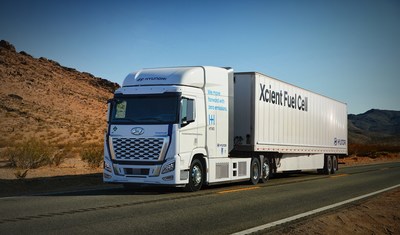Hyundai's XCIENT Fuel Cell Hitting the Road in California
Hyundai Motor Company announced its plan to deploy 30 hydrogen fuel cell electric heavy-duty trucks in California to enhance air quality, starting in the second quarter of 2023. This initiative includes funding of $22 million from California Air Resources Board and $7 million from local agencies. The XCIENT Fuel Cell trucks have proven commercial viability through over one million kilometers of real-world driving. A 12-month pilot program will also operate two trucks in Southern California, funded by a $500,000 grant from South Coast AQMD. The project aims to establish a zero-emission commercial fleet in the U.S.
- Deployment of 30 XCIENT Fuel Cell trucks in California by early 2023.
- Secured $22 million in grants from California state agencies and $7 million from local bodies.
- Trucks have demonstrated commercial viability with over one million kilometers driven.
- Plans for a high-capacity hydrogen refueling station in Oakland, supporting up to 50 trucks.
- None.
FOUNTAIN VALLEY, Calif. and SEOUL, South Korea, July 26, 2021 /PRNewswire/ -- Hyundai Motor Company today announced its plan to deploy the company's latest hydrogen fuel cell electric heavy-duty trucks in California, for two publicly funded projects to improve the air quality in the region. The demo trucks that Hyundai will bring into the United States are developed based on XCIENT Fuel Cell, the world's first mass-produced, heavy-duty truck powered by hydrogen.
Debuting last year in Switzerland, XCIENT Fuel Cell has proven its commercial viability through more than one million kilometers of driving in real-world conditions. The U.S. model provides a maximum driving range of 500 miles, or about 800 kilometers.
Hyundai will leverage insights gained from these public projects to develop it's zero-emission commercial fleet business in the U.S. and establish local partnerships across the value chain.
Deploying 30 XCIENT Fuel Cell trucks in northern California by early 2023
Hyundai Motor teamed with public and private partners in the U.S. to operate 30 units of Class 8 XCIENT Fuel Cell trucks, starting from the second quarter of 2023. This will be the largest commercial deployment of Class 8 hydrogen-powered fuel cell trucks in the U.S.
A consortium led by the Center for Transportation and the Environment (CTE) and Hyundai Motor recently won
Hyundai's NorCAL ZERO project, also known as Zero-Emission Regional Truck Operations with Fuel Cell Electric Trucks, will deploy 30 units of Class 8 XCIENT Fuel Cell, with a 6x4 drive axle configuration, to northern California by the second quarter of 2023. Glovis America, a logistics service provider, will be the fleet operator of these trucks. Macquarie's Specialized and Asset Finance business, part of its Commodities and Global Markets division, will finance the trucks through a lease to the operator.
"We are proud to fund this hallmark deployment of 30 hydrogen fuel cell electric trucks and improve the air quality in Northern California," said Hannon Rasool, Deputy Director of Fuels and Transportation Division at the California Energy Commission. "These investments will support zero-emission trucks and infrastructure development and deployment as part of the US market ecosystem. Public and private project partners have come together to take a big step forward in decarbonizing freight and goods movement, as part of CARB and CEC's clean air initiatives."
The consortium also plans to establish a high-capacity hydrogen refueling station in Oakland, California that will be able to support as many as 50 trucks with an average fill of 30 kilograms.
12-month pilot program with fleet partner to operate two XCIENT Fuel Cell
Hyundai Motor was also awarded a
Hyundai Motor and its fleet partner plan to begin operating these trucks in August. They will be used for long-haul freight operations between warehouses in southern California for a 12-month period. Hyundai will also work with the market leader in hydrogen refueling stations in California, First Element Fuel (FEF), to utilize three hydrogen refueling stations in the region to refuel the trucks.
"We look forward to seeing this important fuel cell project from Hyundai come to life," said Ben J. Benoit, South Coast AQMD's Governing Board chair. "The development of long-haul zero-emission truck technology is key to reducing emissions that will provide immediate benefits to our air and our communities."
Hyundai Motor was able to gain the support of California funding agencies and local communities to demonstrate its hydrogen fuel cell heavy-duty commercial vehicles, in large part due to the XCIENT Fuel Cell truck's proven track record in Europe. In 2020, Hyundai announced its plan to deliver 1,600 XCIENT Fuel Cell trucks to Europe by 2025. The first 46 units were delivered to Switzerland last year, and they have cumulatively driven more than one million kilometers, or about 620,000 miles, in 11 months of service. During that time, the fleet has reduced CO2 emissions by an estimated 630 tons, compared to diesel-powered vehicles.
The Class 8 XCIENT Fuel Cell trucks that Hyundai will deploy in California will have a maximum driving range of 500 miles, because the hydrogen will be stored in greater quantity on the vehicle in tanks rated at 700 bar, or about 10,000 psi, of pressure. The maximum gross combination weight of Class 8 XCIENT Fuel Cell truck will be more than 37 tons, or about 82,000 lbs.
Based on the experience gathered from the initial demonstrations, Hyundai will accelerate its effort to officially launch its zero-emission commercial trucks in North America. Hyundai is already in talks with multiple logistics and commercial companies that are interested in leveraging hydrogen technology for their freight delivery and drayage services in the U.S. In the long-term, Hyundai will strive to establish hydrogen value chains with local partners by introducing diverse commercial vehicle lineups powered by hydrogen.
For more information about Hyundai Motor's XCIENT Fuel Cell, please visit:
https://trucknbus.hyundai.com/hydrogen/en
About Hyundai Motor Company
Established in 1967, Hyundai Motor Company is present in over 200 countries with more than 120,000 employees dedicated to tackling real-world mobility challenges around the globe.
Based on the brand vision 'Progress for Humanity,' Hyundai Motor is accelerating its transformation into a Smart Mobility Solution Provider.
The company invests in advanced technologies such as robotics and Urban Air Mobility (UAM) to bring about revolutionary mobility solutions, while pursuing open innovation to introduce future mobility services.
In pursuit of a sustainable future for the world, Hyundai will continue its efforts to introduce zero emission vehicles equipped with industry-leading hydrogen fuel cell and EV technologies.
More information about Hyundai Motor and its products can be found at:
http://worldwide.hyundai.com or http://globalpr.hyundai.com
About CALIFORNIA CLIMATE INVESTMENTS
Zero-Emission Drayage Truck and Infrastructure Pilot Project is part of California Climate Investments, a statewide initiative that puts billions of Cap-and-Trade dollars to work reducing greenhouse gas emissions, strengthening the economy and improving public health and the environment — particularly in disadvantaged communities. Learn more at caclimateinvestments.ca.gov.
![]() View original content to download multimedia:https://www.prnewswire.com/news-releases/hyundais-xcient-fuel-cell-hitting-the-road-in-california-301340596.html
View original content to download multimedia:https://www.prnewswire.com/news-releases/hyundais-xcient-fuel-cell-hitting-the-road-in-california-301340596.html
SOURCE Hyundai Motor Company
FAQ
What is Hyundai's plan for hydrogen fuel cell trucks in California?
How much funding did Hyundai receive for its California hydrogen truck project?
What is the driving range of Hyundai's XCIENT Fuel Cell trucks?
When will the deployment of the XCIENT Fuel Cell trucks begin in California?









